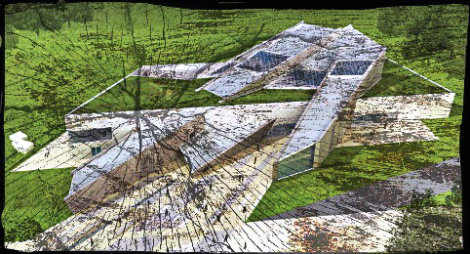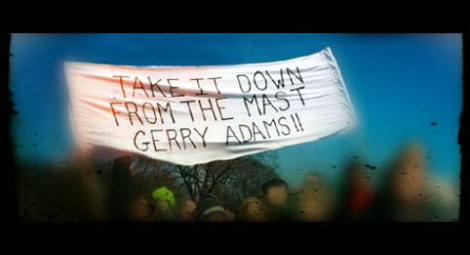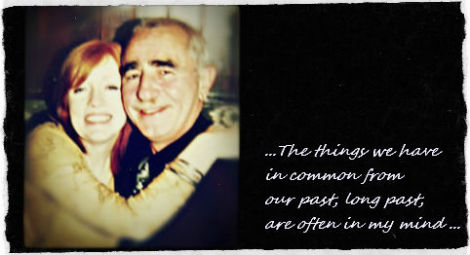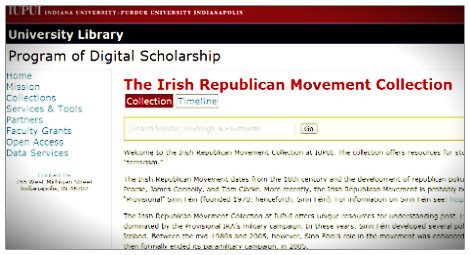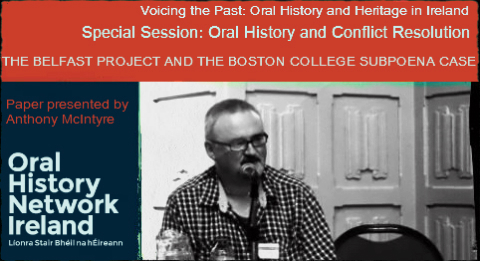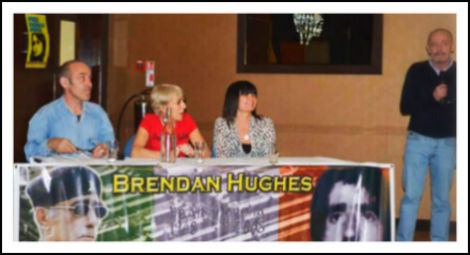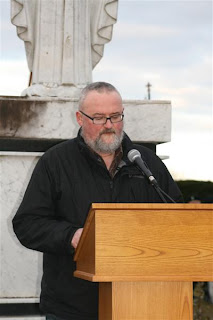Discussion of Boston College/IRA Oral History Case
SAA’s Government Affairs Working Group has drafted a document
summarizing a case in which Boston College had signed an agreement to
house oral histories regarding the “Troubles in Ireland” that later were
subpoenaed.
Response of Belfast Project Lead Researcher Dr. Anthony McIntyre
Lead researcher for the Belfast Project, Dr. Anthony McIntyre,
offers his response to the SAA/GAWG document on the Boston College/IRA
Oral History case.
In response to a recent statement prepared by the Society of American
Archivist Government Affairs Working Group for SAA Council discussion
on the ‘Boston College/IRA Oral History Situation’ it was somewhat
dispiriting to read
the following comment from Society of American Archivists President, Jackie Dooley:
Today we hear from Frank Boles, SAA past president and chair of our Government Affairs Working Group,
who led the work to develop our statement. He and his merry band of
GAWGers always do excellent research and thinking before they send a
document to Council, and this one is no exception.
It struck me that a casual reader could be forgiven for deducing that
that Ms Dooley and I had been reading different documents from Frank
Boles: the one he submitted to the SAA Council and then another which
the Council put out as a discussion statement outlining its stance in
respect of the Boston College legal battle.
Without being dogmatic, it simply defies standards of excellence to
attribute ‘excellent research’ to Boles and his colleagues who took the
lead role in the preparation of the SAA statement on the Boston College
affair. This is hardly a churlish response from an aggrieved researcher.
It is easily borne out by the litany of incontestable mistakes that
‘excellent research’ could never have plausibly churned out. Ms Dooley,
if she is familiar with Euripides, would appreciate the prudence in his
comment that ‘a bad beginning makes a bad ending.’ Alternatively a
purposeful bad end can produce a bad beginning. Consequently, one is
compelled to explore the possibility that the end result of taking no
action was decided in advance and the research tailored to fit.
Some of the mistakes that litter the SAA discussion statement are
surface flaws, which, while indicating sloppiness, are not catastrophic.
Others are serious foundational errors and for that reason are
considerably more egregious. Both sets, when aggregated, point in the
direction of an absence of serious research and in its stead a
superficial scan.
This is all the more regrettable because in spite of being asked by
some of its membership to intervene in the Boston College Subpoena case,
‘the SAA Council believes that it is inappropriate for the Society to
take a formal position on the case or on the concept of “archival
privilege” at this time.’ While ultimately any strategic initiative is a
matter for the Council, it would be an intellectual travesty if this
disappointing decision by the Council is based on specious reasoning.
While the interpretation of the facts is a matter for the authors
who, in the interests of intellectual autonomy must have latitude to
interpret, it is not within the gift of the authors to designate as
facts matters that have no demonstrable basis in fact.
Moving from surface to foundational, an itemisation of the errors
that appear in the SAA Council statement should suffice to indicate
something other than best practice.
- The introductory paragraph of the background section confuses the donor
agreement with the contract between Project Director Ed Moloney and
Boston College, and suggests it is unclear whether Boston College had
signed it or not. The Moloney contract was
signed, not ‘apparently’ signed, by Burns Librarian Robert O’Neill, as
were the donor agreements given to each interviewee. O’Neill refers to
having signed the Moloney contract in his affidavit; his signature is
clearly visible in the copy attached to his affidavit and submitted to
the court:
More substantially:
- The subsidiary agreement was not drawn up between the ‘scholars
undertaking the project and the interviewees.’ It was an agreement
between Boston College and the interviewees, written up by Boston
College on Boston College headed paper, and signed by the Burns
Librarian at Boston College. An example of the agreement form given to
all interviewees is available online: http://bostoncollegesubpoena.wordpress.com/exhibits/respondent-hughes-agreement/
- Boston College staff did not merely either fail to ‘review or
reviewed insufficiently the agreements drawn up for participants’
signatures.’ Boston College drew up the agreements for the participants’
signatures. This is a matter of public record for which there is an
easily accessible paper trail, and which Ed Moloney has thoroughly
addressed in his response to the SAA.
- The researchers at no time
‘made additional written promises to participants in the oral history
project that went beyond those offered by Boston College, but project
staff did not disclose to participants that these additional assurances
were made on behalf of the project staff and did not represent the
position of Boston College … These additional assurances apparently were
founded in the researchers’ belief in a legal theory of “archival
privilege” previously rejected by a federal court.’
This last assertion on the part of the SAA Council is so demonstrably
false and misleading that only with extreme reluctance could it be
accepted as something issued in good faith. Not a scintilla of evidence
for such a bald statement has been forthcoming. Where is the evidence
that the researchers ever gave ‘additional assurances’ to the
participants?
In a matter considered so important that the SAA Council thought it
worthy of public comment, it is striking that so little effort was put
into getting it right. The Council simply packaged a falsehood based on
lazy rather than excellent research, and passed it off as factual. It is
not difficult to conceive of a corollary whereby the researchers would
be excoriated and Boston College exonerated. Is the instinct to protect
the institution so strong that it cannot resist the tendency to close
ranks and displace culpability onto those considered least able to fight
their corner?
There was no additional written agreement made available to the interviewees. What appeared in the
Hughes [donor] Agreement,
minus Mr Hughes’ own amendments, was the sole template for the donor
agreement that was used in every case. It was inscribed on Boston
College headed paper and signed off on by the Burns Librarian, Professor
Robert O’Neill. Again, from O’Neill’s affidavit, paragraphs 6 and 7:
“6. Each person interviewed for the Belfast Project was
offered a donation agreement directing that his or her interview
materials be deposited in the Burns Library at Boston College. If the
interviewee agreed to the donation, the donation form reassured the
interviewee that no part of the interviews would be released without the
interviewee’s approval or until the interviewee died, whichever came
first.
7. A uniform donation agreement for Belfast Project interview materials
was offered to all interviewees. It was the same as the form signed by
one of the interviewees, the late Brendan Hughes, that is annexed to
this statement as O’Neill Attachment 2, except that the Hughes donation form has additional handwritten terms that he requested.”
There is nothing whatsoever that would lend itself to even a
speculative assumption, let alone the firm conclusions arrived at by the
SAA Council, that the researchers ever at any point entered into a side
agreement with the interviewees or expanded the terms of
confidentiality independent of Boston College. The researchers gave to
the participants only what Boston College drew up and approved. Neither a
word more nor a word less; no side agreements or undertakings.
Much of the skewed thrust of the SAA Council statement aims at
establishing the case that Boston College, because it mentioned in the
agreement between it and project director Ed Moloney that the project
was subject to ‘the extent of American law’, should somehow be absolved
of the lion’s share of responsibility. And so we have this:
Boston College officials appear to have been clear, when
an agreement initially was reached to undertake this project and house
the resulting oral histories in the college library, that all promises
of confidentiality made to interviewees were subject to U.S. law.
I first take issue with the claim that
“Boston College officials appear to have been clear… that … promises …were subject to U.S. law”;
up until the arrival of the subpoenas, Boston College were very clear
that the confidentiality of the archive would be protected, by Boston
College, in all circumstances. For example:
- In the preface to Voices from the Grave, Hachey and O’Neill wrote,
“Boston College is contractually committed to
sequestering the taped transcriptions unless otherwise given a full
release, in writing, by the interviewees, or until the demise of the
latter.”
- In a 2010 interview with the Irish News, Hachey said,
“They [interviewees] also needed to know that we would
honour an agreement not to publish any of their testimony until death.
The only caveat is that if they give their consent before their death in
writing, that would clear us legally.”
- He also said, in an interview with the News Letter,
“We began this oral history on the understanding that the
documents would be sequestered and embargoed in the archives at the
Burns Library here in Boston. That seemed to be very reassuring to a
number of people.”
- In a 2011 article written by Editor Sean Smith for Boston College’s in-house publication, The Boston College Chronicle, for which the sources were Hachey and O’Neill and neither myself nor Ed Moloney, Boston College’s position was very clear:
“[Brendan Hughes and David Ervine, subjects of Voices from the Grave],
along with nearly three dozen other former combatants interviewed for
the project, were guaranteed that no interview material would be used
without their consent or until after their death. Ervine died in 2007,
Hughes in 2008.”
Even after the arrival of the first subpoena, Boston College remained clear:
- “There was information that was clearly granted on the condition of
confidentiality, with the expectation that it would provide a benefit
for posterity, a historical narrative of the Troubles. That was our sole
role in getting involved in the project, continuing our effort at peace
and reconciliation in Northern Ireland, being a repository for these
tapes of great historical value.” – Jack Dunn, 25 May 2011
- “The assurances of confidentiality at the start and during the
interview process were subsequently documented when the interviews were
concluded. Each interviewee was given a form to donate his or her
interview materials to the Burns Library at Boston College on the
express condition that the materials would not be disclosed, absent the
interviewee’s permission, until after his or her death.” – MOTION OF
TRUSTEES OF BOSTON COLLEGE TO QUASH SUBPOENAS
- “I want you to know and you can quote me on this, any one of you,
because I don’t think the president (Fr Leahy) would mind me divulging
this and he would certainly confirm it, but he said: ‘I want you to
understand,’ he wasn’t talking to me specifically but to my two
colleagues (Jack Dunn & Nora Fields), ‘I want you to understand that
we are not going to allow interviewers or interviewees to be
compromised in this.’” – Professor Thomas Hachey, May 16th 2011
- “We aren’t letting anybody into (the archive) and they are not
touching it. That’s going to be the bottom line”. – Professor Thomas
Hachey, May 16th, 2011
- “B.C. is firmly and unconditionally committed to respecting the
letter and intent of what is a contractual agreement never to release
any of the material to anyone unless given permission in writing
(notarized) beforehand by the participant, or until the demise of a
participant.” – Professor Thomas Hachey, 23 May, 2010
All of these quotes and more are available online:
http://bostoncollegesubpoena.wordpress.com/supporting-documents/boston-college-confidentiality-public-references-to-agreement/
In addition, it is my definite understanding that the donor
agreement/Hughes Agreement issued to the participants was predicated on
the initial agreement [the Moloney contract] which contained the phrase
to ‘the extent of American law’.
If the donor agreement produced by Boston College was in any way
inconsistent with ‘the extent of American law’, why was it codified by
the College and issued as an informed consent form to the participants?
Had US law not have enabled the terms of the donor agreement, then it
was incumbent on BC to state that ultimate power of release lay with
the interviewees ‘except as required by law, subpoena or court order’.
BC, having knowingly stated outside the donor agreement that the
conditions of the interviews were to the extent allowed by American law,
must have issued a donor agreement it believed consistent with US law,
and not contrary to it.
Professor John Brewer, whom I remain fundamentally at odds with in
relation to the issue of where culpability resides on the Boston College
case, does make a valid point
when he says that “informed-consent forms always explain that confidentiality will be maintained only to the full extent provided under the law”.
In
my response to Professor Brewer I made the point that, ‘Always … except when the forms are issued by Boston College.’
Boston College has yet to explain what many observers feel is a discrepancy between its own two agreements.
Other issues in the SAA paper are matters of interpretation arguably underpinned by asymmetrical reasoning:
Boston College officials failed, however, to exercise
ongoing diligence over the project … Such review should have led Boston
College staff to draw this matter to the attention of the project staff
in order to utilize appropriate language in the agreements regarding
confidentiality.
This begins to sound like an attempt to create a shield which
protects the institution. It suggests that Boston College at worst
adopted a hands-off approach. Because the SAA Council failed to do the
research that its ultimate deliberations should have been underpinned
by, it is incapable of following the linear logic that would easily
permit it to conclude that Boston College did not leave it to the
researchers in the field to reach agreement with the interviewees and
that therefore the failing of the College is not one of post facto
inadequate supervision but one that was built into the design of the
project. There was no distance between Boston College staff and the
donor agreements, no mediators acting with latitude, through which the
College’s intent was misinterpreted.
On the issue of Ed Moloney’s book,
Voices From the Grave,
the SAA Council statement fails to follow through on the logic and shies
away from asking the very obvious question: if Boston College, which
gave its imprimatur to the book, genuinely believed that the extent of
American law restricted rather than enabled confidentiality, was it not
imperative on the College prior to the publication of the book to warn
Moloney then?
So the flawed reasoning underpinning the SAA Council’s approach to
the matter naturally produces a conclusion consistent with the errors in
the research:
Given these circumstances—that the project staff, for
whatever reason, chose to ignore existing case law and assure
participants that a greater level of confidentiality could be given the
oral histories than could reasonably be assumed, and that Boston College
failed to carefully review the legal agreements signed by participants
for conformity with the promises about confidentiality made by the
College and to insist that those promises be represented in writing—the
Government Affairs Working Group suggests that SAA take no position on
the case at hand.
Distilled down it simply means the GAWG suggested to the SAA Council
that it do nothing because the GAWG got it wrong and was incapable of
arriving at a more balanced conclusion.
The SAA Council, having based its non interventionist recommendation
on deeply flawed research, is ethically required to make right what it
did wrong. There is so much at stake in this case for archivists that to
allow an adverse outcome to result from badly informed inaction, would
be to do irreparable harm to the art/practice of archiving and research.
The SAA Council, now that the shortcomings underpinning its ultimate
decision have been brought to its attention, could do worse than retrace
its steps, review its own research and revise its strategic position in
relation to the ongoing legal battle by positively responding to the
requests for intervention made by some of its membership.
Louis XVI once said, ‘surely the archbishop of Paris must at least
believe in God.’ The Society of American Archivists must at least
believe in the right to protect archives.













